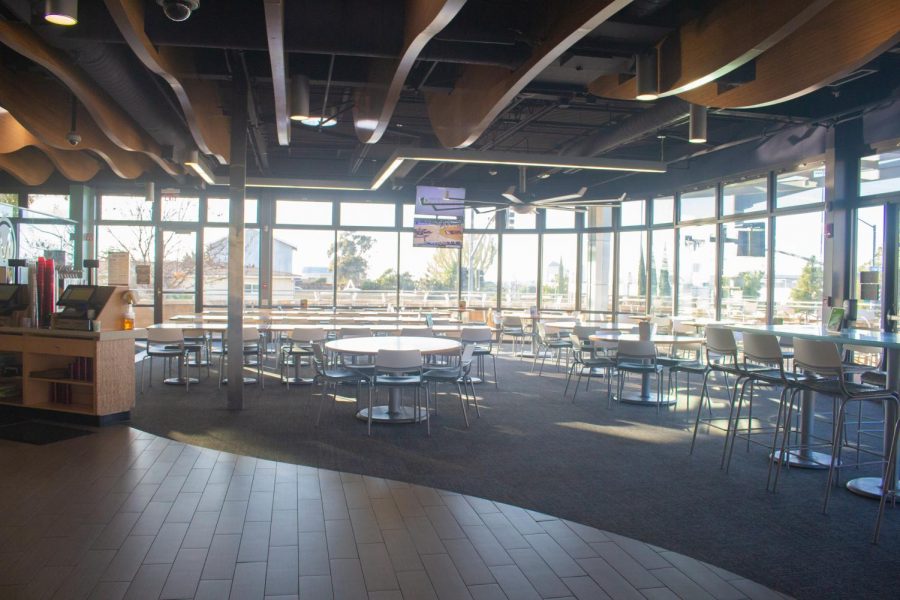New technology updates at University Towers Kitchen have eliminated the need for physical buzzers.
Instead of using pagers to alert students that their food is ready — as done in previous semesters — UTK unveiled TV screens that display individual order numbers where students can track the progress of their order.
With the new register system, called “Symphony,” the TV screens display the number that corresponds with your receipt. When the bar underneath your number is red, your order is in progress. When the bar turns green, your food is ready to eat.
The updated system also allows customers to use Apple and Google pay.
Director of SDSU Dining Paul Melchior said the new platform at UTK is more efficient for employees and is technologically advanced.
“For us it is seamless, it moves more electronically than physically,” Melchior said.
Because students were unfamiliar with the new process, the first night was rocky according to Melchior. However, as time passes, the system is becoming more normalized.
Melchior said the students’ understanding of the new system is just as important as the employees’ understanding.
“This like anything else is customer training as much as it is employee training,” Melchior said.
Melchior also said this new system would not have been implemented if SDSU Dining did not have confidence in the students ability to adapt to the change.
“I think what allows us to make this jump to this technology is the aptitude of the students,” Melchior said. “Knowing that they will understand the system and know how to use it and know how to make it work for them. If we didn’t have confidence in the aptitude of the students we wouldn’t be able to do this.”
Eliminating physical buzzers saves time for UTK employees, who no longer have to retrieve pagers from the expedite counter back to registers.
Melchior also said sustainability played a factor in the decision to drop the buzzer system.
“We use a lot less electricity without the pagers,” Melchior said.
Robert Isner, assistant director of SDSU Dining, said student health was another factor in eliminating the buzzer system. Because pagers are shared among many students, sanitary issues could arise.
Pagers were wiped down every day, but after every daily use.
“And the other thing you don’t really want to talk about or think about is that pager doesn’t get wiped down,” Isner said.
When asked about potential concerns for individuals who may have trouble seeing the screen, Melchior said the screen should be no harder to see than other things in regular life.
“My response to that would be it’s no more of an impairment for nearsighted than regular life. So if you are nearsighted and you can’t see that screen then you should be getting glasses for regular life,” Melchior said.
Isner also said the screens meet ADAl accessibility requirements for individuals who are color blind,
Once the number on the screen turns green, it stays up there for an additional five minutes.
Isner said food will sometimes have to be remade if customers do not pick it up in time, because the food sitting in the window is no longer fresh.
“If your order goes away (off the screen) we will probably remake your food,” Isner said. “When the number bumps off we go out and look for the person but sometimes they remake the food.”
Both Melchior and Isner said UTK customers should go check on their food if it has been about ten minutes since ordering. They said that the wait time for food is usually between 5 and 7 minutes.
Biochemistry freshman Benjamin Blocher said despite some problems he had experienced with the pager system, he still prefers buzzersover the new system.
“Personally, I liked it better with the last system, but at the same time it did have a lot of problems with each of the little systems breaking and stuff, so I understand the reason why they changed it,” Blocher said. “At the same time, sometimes my number doesn’t show up there and I have to wait and you can see there is a bunch of backed up numbers on there so I feel like it’s not sufficient for them.”
Mechanical Engineering freshman Joshua Jones said he understands why the change may have been necessary, but that he thinks the new system should work differently.
“Personally I think that your number should basically range per TV, so each TV shouldn’t scroll through all the numbers. It should be more that you know one TV and you can just constantly watch it,” Jones said. “And I understand the reasons for it but I do think the old way was so much better. Then again, when a lot of people do come here there is no way they are going to have enough buzzers for everybody.”










